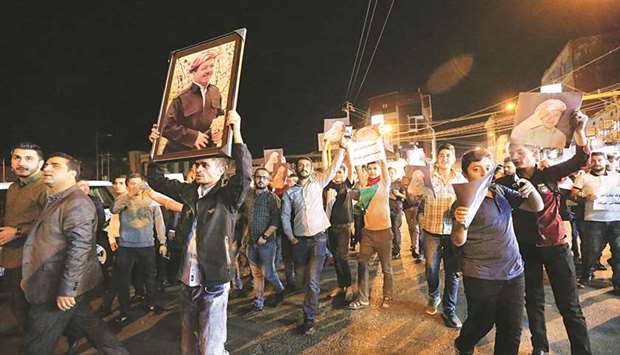Massoud Barzani, the president of the autonomous Kurdish region in Iraq, told a closed-door session of parliament yesterday he was stepping down amid the fallout from a controversial independence referendum.
Also yesterday, the Kurds agreed to surrender to Iraqi forces the strategic border post of Fishkhabur, through which pass oil export pipelines to Ceyhan in Turkey.
“After November 1, I will no longer exercise my functions, and I reject any extension of my mandate,” the 71-year-old Barzani said in a letter read out to parliament in the Kurdish capital Arbil, a copy of which was obtained by AFP.
“Changing the law on the presidency of Kurdistan or prolonging the presidential term is not acceptable,” said the architect of the September 25 independence vote, which led to the Kurds losing to Baghdad’s forces disputed territory and oilfields to which they had laid claim.
“I ask parliament to meet to fill the vacancy in power, to fulfil the mission and to assume the powers of the presidency of Kurdistan”, said the letter.
Barzani said he would “remain a peshmerga” (Kurdish fighter) and “continue to defend the achievements of the people of Kurdistan”. Barzani’s letter was sent to parliament to decide on the provisional redistribution of the presidency’s powers until a presidential election, for which a date has yet to be fixed.
November 1 had originally been slated for both presidential and legislative elections in the Kurdish region of northern Iraq, but these were postponed in the chaos that followed the referendum — which returned a massive “yes” to independence.
Yesterday’s parliamentary session was postponed several times amid political tensions.
Dozens of men rushed at the parliament building late yesterday, hitting out at journalists, media reports and MPs reported.
Police fired in the air to disperse them.
The opposition Goran party which had sought Barzani’s resignation and a “government of national salvation” opposes the redistribution of the presidency’s powers.
That plan was proposed by the major Kurdish parties, Barzani’s Kurdistan Democratic Party (KDP) and its rival Kurdish Patriotic Union (PUK).
Barzani “symbolises the failure of Kurdish politics, and the only thing left for him to do is to issue a public apology,” Goran MP Rabun Maarouf said before the session began.
KDP deputy Ari Harin spoke of an “international plot”.
Barzani had come under growing opposition from his detractors after he organised the referendum on Kurdish independence that triggered a deep crisis with Baghdad.
The federal government deemed the vote unconstitutional, and its forces have since seized a swathe of disputed territory in the north from Kurdish fighters. Territory reclaimed from the Kurds in the sweeping operation included key oilfields in and around the disputed province of Kirkuk.
Yestgerday, a government source in Baghdad said that a deal had been reached under which Baghdad’s forces would deploy at the disputed Fishkhabur border post with Turkey after clashes in the area on Thursday.
The loss of the oilfields, which provided income that would have been critical to an independent Kurdish state, sparked recriminations among the Kurds.
Political life in Kurdistan is dominated by the KDP and PUK of Iraq’s late president Jalal Talabani.
Iraq’s current president, Fuad Masum, is also a PUK member and had backed a push for dialogue between the Kurds and Baghdad before the referendum.
After the vote, Masum said the referendum had triggered the assault on Kirkuk.
Iraq’s neighbours Turkey and Iran, also strongly opposed the non-binding vote, and Ankara on Thursday said the Iraqi Kurdish offer for the referendum to be frozen was “not enough”, instead urging the Arbil government to cancel it.
French President Emmanuel Macron told Prime Minister Haider al-Abadi in a phone call Saturday that “everything possible should be done to avoid fighting between Iraqis”, the presidency in Paris said.
Barzani’s move comes with Abadi’s forces engaged in battles in the west with holdout militants of the Islamic State group, assaulting what the premier called “the last den of terrorism in Iraq”, Al-Qaim on the border with Syria.
The mandate of Barzani, the first and only elected president of the autonomous Kurdish region, expired in 2013.

Demonstrators gather in the streets in support of Kurdish president Massoud Barzani in Duhok, Iraq.
